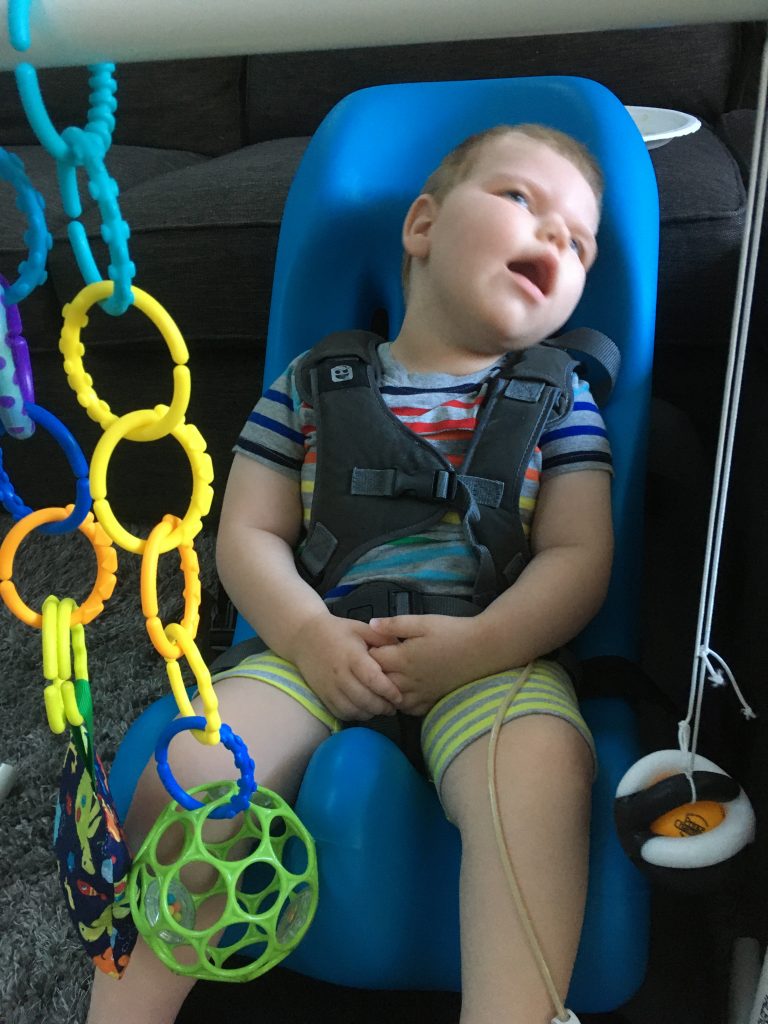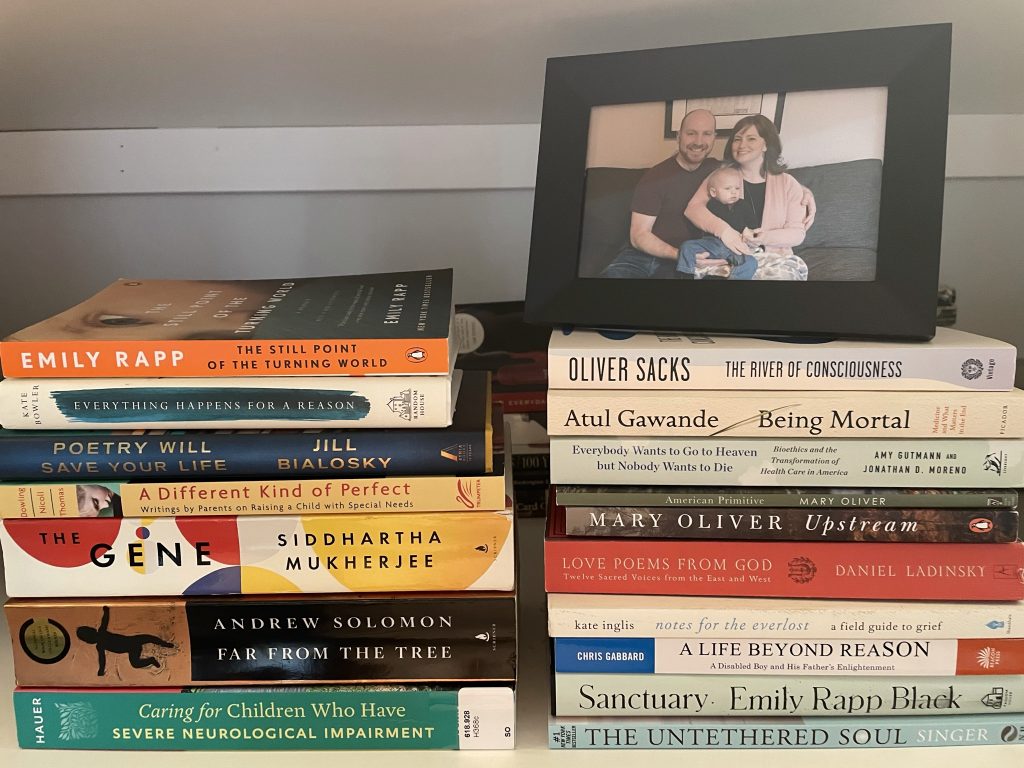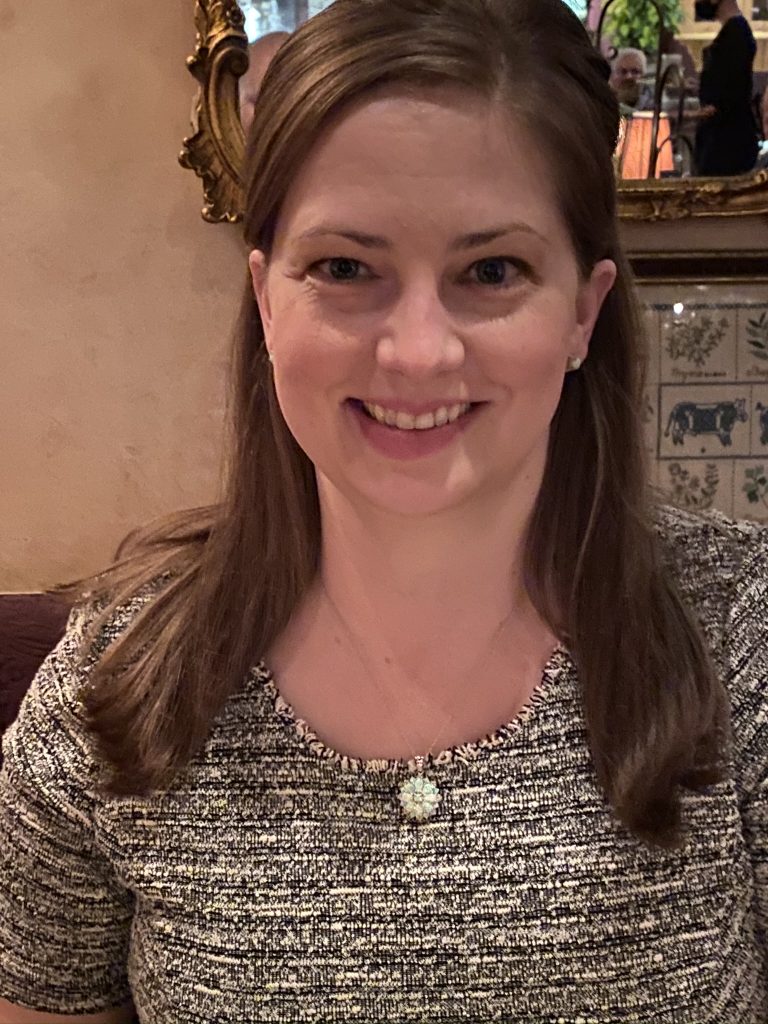8/10/2021
·Enable high contrast reading
Finding My Antidote to Fear

The bottom falls out of the plane, and I plummet towards the forest below. I know death is imminent, but it is not the final impact that scares me. The terror that swirls in my core is the fear of the free-fall. Knowing that I have time, too much time, to think about my impending end. Wishing it would just arrive already, so that I could bypass the agony of waiting to be fatally wounded.
 And so goes the first of several nightmares that jolted me awake in the early days of Colson’s infancy and diagnosis of mitochondrial disease. Fear of the unknown stalks every parent. It is compounded for those of us who love a child with a serious illness. It’s not satisfied to keep us on edge in our waking hours. It insists on finding us everywhere, even in our sleep. Faith is an antidote to fear for many people. Having something, anything, to believe in provides a framework to reassemble the parts of ourselves that are jumbled beyond coherence when our child becomes ill, and as their illness progresses. Faith makes it safe to be undone and remade a million times over. The universally tough question of “what do I really believe in?” becomes infinitely more urgent when that belief may have life and death implications for your child and family.
And so goes the first of several nightmares that jolted me awake in the early days of Colson’s infancy and diagnosis of mitochondrial disease. Fear of the unknown stalks every parent. It is compounded for those of us who love a child with a serious illness. It’s not satisfied to keep us on edge in our waking hours. It insists on finding us everywhere, even in our sleep. Faith is an antidote to fear for many people. Having something, anything, to believe in provides a framework to reassemble the parts of ourselves that are jumbled beyond coherence when our child becomes ill, and as their illness progresses. Faith makes it safe to be undone and remade a million times over. The universally tough question of “what do I really believe in?” becomes infinitely more urgent when that belief may have life and death implications for your child and family.
I decided a long time ago to subscribe to a “big-tent” spirituality. I was raised in a faith tradition that promoted, in my experience, restrictive definitions of worth and punitive responses to personal development. As a young adult, it became important to me to center my values and my faith not around a specific theology, but around the fundamental belief that there is power in any ontology that encourages people to love themselves and each other well – with respect, compassion, and humility.
The church of poetry is one of my favorite places of worship. Even as I type this, my inner millennial cynic is rolling her eyes so hard. But as a true evangelist, I will weather the doubt at my own earnestness. Poetry, for me, was a grounding force in Colson’s life, and continues to guide me in his death. In the early days of his illness, when I woke up weeping and afraid that my fear of the future would prevent me from being present with him the way I needed to be, poetry helped me find the right hooks to hang my broken heart on.
 In the anthology She Walks in Beauty: A Woman’s Journey Through Poems, Caroline Kennedy notes that “[P]oetry and prayer are not so different,” and I couldn’t agree more. Both allow for quiet reflection. Both encourage setting intentions. And, for many, both can provide revelations. Lucille Clifton’s blessing the boats helped me understand the power of acceptance for Colson’s complex little life. I felt less alone grappling with the limits of Colson’s longevity when I discovered W.S. Merwin’s poem Youth in Jill Bialosky’s anthology-memoir Poetry Will Save Your Life. Here, she notes that poetry, “…gives shape to those empty spaces within us that we have no words for until we find them in a poem.”
In the anthology She Walks in Beauty: A Woman’s Journey Through Poems, Caroline Kennedy notes that “[P]oetry and prayer are not so different,” and I couldn’t agree more. Both allow for quiet reflection. Both encourage setting intentions. And, for many, both can provide revelations. Lucille Clifton’s blessing the boats helped me understand the power of acceptance for Colson’s complex little life. I felt less alone grappling with the limits of Colson’s longevity when I discovered W.S. Merwin’s poem Youth in Jill Bialosky’s anthology-memoir Poetry Will Save Your Life. Here, she notes that poetry, “…gives shape to those empty spaces within us that we have no words for until we find them in a poem.”
I love the notion of reading poetry, or practicing any faith, as a process of discovery. It resonates with my experience of caring for Colson. I didn’t know what challenges would emerge for our family after he was diagnosed, but I knew I wanted our lives together to unfold gently, rather than unravel chaotically . And for that to happen, I had to ground myself in a version of reality that did not feel like an unending free-fall. Poems (and my people) were my parachutes – easing me into a world where I could love mothering a child I knew I would outlive. My hope for every courageous caregiver, and for the providers who bear witness to their search for meaning, is that you will find your solace in whatever place allows you the most presence with your child. They, and you, deserve it.
Additional suggested reading:
- The Poetry of Impermanence, Mindfulness and Joy by John Brehm (Editor)
- The Carrying: Poems by Ada Limon
- Cries of the Spirit: More Than 300 Poems in Celebration of Women’s Spirituality by Marilyn Sewell (Editor)
- The Art of Losing: Poems of Grief and Healing by Kevin Young (Editor)
 Liz Morris loves exploring complex questions. Her professional experiences in project management, librarianship, and community development prepared her well for her favorite role as mom to Colson. Colson, impacted by mitochondrial disease since birth, inspired Liz to face the complicated aspects of his life through writing and advocacy. Liz serves as a family advisor at Seattle Children’s Hospital, and is a volunteer ambassador for the United Mitochondrial Disease Foundation. She is committed to helping families find the information they need to help them live well in the face of life-limiting illness. You can find Liz on Instagram @mrsliz.morris
Liz Morris loves exploring complex questions. Her professional experiences in project management, librarianship, and community development prepared her well for her favorite role as mom to Colson. Colson, impacted by mitochondrial disease since birth, inspired Liz to face the complicated aspects of his life through writing and advocacy. Liz serves as a family advisor at Seattle Children’s Hospital, and is a volunteer ambassador for the United Mitochondrial Disease Foundation. She is committed to helping families find the information they need to help them live well in the face of life-limiting illness. You can find Liz on Instagram @mrsliz.morris





